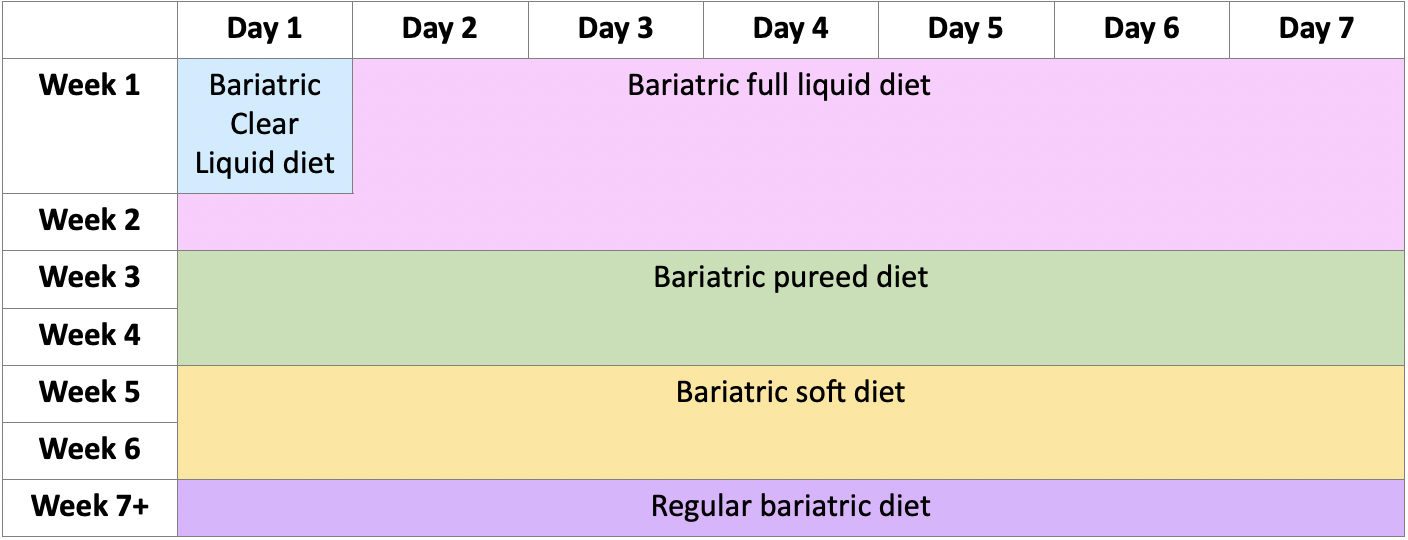What to Expect
Most people stay in the hospital for 1-2 nights after bariatric surgery. Patients are started on a special diet before surgery and continue advancing the diet when they go home. Patients are responsible to follow the guidelines after surgery in what they eat and their activity. Successful patients follow these guidelines and are motivated to exercise and alter behaviors that help them stay on track. There are many adjustments in lifestyle that must be made with bariatric surgery.
After your surgery, you should expect to spend at least one night in the hospital. This will allow your doctor to help manage your pain, make sure that you understand your post-surgery diet and lifestyle changes, and monitor for any complications. You may experience some pain right after surgery, but your doctor will prescribe medication to help manage your pain.
You will be started on a bariatric clear liquid diet after surgery. At first, you will only be able to sip 1 ounce (30 ml) every 15 minutes. Even though you will probably feel tired after surgery, make sure that you are walking as much as possible to help improve gas pain and decrease your risk of complications. Once you leave the hospital, your journey really takes off.
What are the expected dietary recommendations after surgery?
Bariatric surgery changes your digestive system and affects how much food you can eat and what foods you can tolerate. There are five stages to the bariatric diet; each stage is designed to support you as your body heals from surgery. The diet stages for each program may be slightly different, but should look something like this:
Typical Diet Advancement Plan

What are the expected physical activity recommendations after surgery?
It takes time to recover from bariatric surgery, and everyone’s experience is unique. At first, you will likely be tired and experience some discomfort, but this will improve over time. Light physical activity (walking, elliptical, or a stationary bike) is recommended for the first 6 weeks after surgery. You should not lift more than 15 pounds and avoid bending/twisting for the first 6 weeks. Early, light physical activity will promote blood flow and aid in recovery. After the first 6 weeks, you should gradually increase your physical activity as you are able to help with weight loss and to prevent weight regain. Physical activity is an important tool after bariatric surgery.
How much weight can I expect to lose after surgery?
Weight loss is one of the primary goals of bariatric surgery. It is important to note that the amount of weight you may lose will vary. Your surgery type, initial weight, adherence to dietary and physical activity recommendations, and your metabolism will affect the amount of weight that you can lose. The typical percent of expected total body weight loss by procedure type is listed below:
Percent of Total Body Weight Loss by Procedure
| Procedure | % Total Body Weight Lost |
|---|---|
| Sleeve gastrectomy (SG) | 25-30% |
| Roux-en-Y gastric bypass (RYGB) | 30-35% |
Most of your weight loss will happen within the first year. After that, it is important to work on weight maintenance and focus on victories that happen off your bathroom scale, such as improving health.
Will my health improve after bariatric surgery?
For most bariatric surgery patients, the answer is yes. Bariatric surgery can improve or even resolve many of your weight-related comorbidities, such as high blood pressure and diabetes. The likelihood of resolution varies by the type of procedure you have and other patient factors. The percentage of comorbidity resolution by procedure type is listed below:
| Procedure | Hypertension (HTN) | Diabetes (DM) | Hyperlipidemia | Sleep Apnea | Gastroesophageal Reflux Disease (GERD) |
|---|---|---|---|---|---|
| Sleeve gastrectomy (SG) | 65% | 60% | 75% | 60% | 75% |
| Roux-en-Y gastric bypass (RYGB) | 75% | 80% | 85% | 75% | 95% |
Adapted from ASMBS’s Essentials of Bariatric & Metabolic Surgery App Essentials of Bariatric & Metabolic Surgery on the App Store (apple.com)
What emotional and psychological changes may happen after surgery?
Rapid weight loss and lifestyle changes after bariatric surgery can result in significant emotional and psychological changes. While weight loss can improve self-esteem and body image, it can also evoke complex emotions. It is common to experience shifting moods, body image issues, and changing relationships after surgery. It is important that you talk with your doctor, continue to attend support group meetings, and consider therapy to help navigate these changes.

